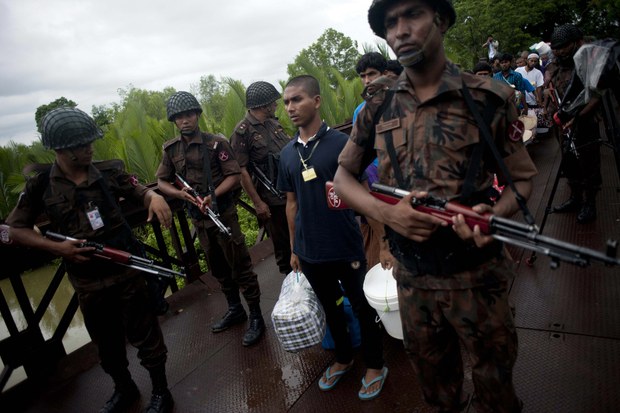Bangladesh to Count Undocumented Rohingyas
2016.02.17
 Armed guards transfer Rohingya Muslims back to Bangladesh after their boat was found adrift off Myanmar’s coast, June 8, 2015.
Armed guards transfer Rohingya Muslims back to Bangladesh after their boat was found adrift off Myanmar’s coast, June 8, 2015.
Starting next month, Bangladeshi authorities plan to undertake the first-ever census of undocumented Rohingya Muslims living in the country’s southeast.
Thousands of ethnic Rohingyas who fled persecution in neighboring Myanmar are believed to be in Bangladesh illegally, but the head count will help Bangladesh clarify the number, an official said.
“We will start the work by the end of March. The census would take a maximum of 25 days to finish,” Census project director Alamgir Hossain told BenarNews.
The census will focus largely on Cox’s Bazar, a southeastern district that borders Myanmar’s Rakhine state, from where Rohingya Muslims have been fleeing from persecution at the hands of the neighboring country’s Buddhist majority.
Human rights watchdog Amnesty International last year called Rohingyas “the most persecuted refugees in the world.” In 2015, an international humanitarian crisis gripped Southeast Asia when thousands of Rohingyas and Bangladeshi migrants landed on local shores, after Thai authorities had imposed a maritime blockade on boats operated by human traffickers.
“I do not want to go back to Myanmar; here I can at least sleep. But there, the Moghs (Buddhists) and the military snatch our belongings whenever they want. We, the Rohingyas, are not human beings there,” septuagenarian Abdul Latif, who lives in Bangladesh, told BenarNews.
‘You must have data’
Bangladesh’s government officially recognizes about 33,000 Rohingyas who have been living in refugee camps in the Ukhia and Nowapara sub-districts of Cox’s Bazar.
Members of the ethnic group have been living in the district since 1992, when more than 200,000 Rohingyas crossed into Bangladesh to escape persecution by Myanmar’s military.
In 2012, sectarian violence involving the majority Buddhists in Rakhine state resulted in undocumented Rohingya Muslims spilling into Bangladesh.
According to a parliamentary report published in 2013, at least 300,000 “illegal” Rohingya live in Cox’s Bazar alone.
Alamgir Hossain said that the Bangladesh Bureau of Statistics would finish identifying Rohingya households inside Bangladesh by Feb. 20, as a first step in determining the number of undocumented Rohingyas.
The census will help the government determine the number of Myanmar nationals living in Bangladesh illegally and highlight the socio-economic conditions of “irregular” Rohingyas, he said. “Irregular” Rohingyas are those who are not registered as refugees with the government.
The census could help Bangladesh put diplomatic pressure on its neighbor to improve the human rights situation in Rakhine said, said a former Bangladeshi foreign minister.
“You must have data when you talk in a forum. So, we need the census to know how many Rohingyas have been living in Bangladesh illegally when we talk with Myanmar, Shahsher Mobin Chowdhury told BenarNews.
Potential problems with count
C.R. Abrar, a professor of international relations at Dhaka University, warned that the census could run into roadblocks and that a large number of Rohingyas could go uncounted.
“There is a reason for raising questions about the potential success of the census. This is because a large number of Rohingya refugees live in hideouts, and the enumerators will go to the identified household where the Rohingyas have been living,” Abrar, who coordinates the Refugee and Migratory Movement Research Unit, a private think-tank, told BenarNews.
Elsewhere, problems could arise due to resistance among Bangladeshis to the presence in their country of undocumented Rohingyas.
In Ukhia, local resident Hamidul Haque Chowdhury has formed a Rohingya resistance committee.
“They have destroyed our opportunities, forests and facilities,” committee member Abdus Samad told BenarNews, saying that the Rohingyas had to go back to Myanmar.







